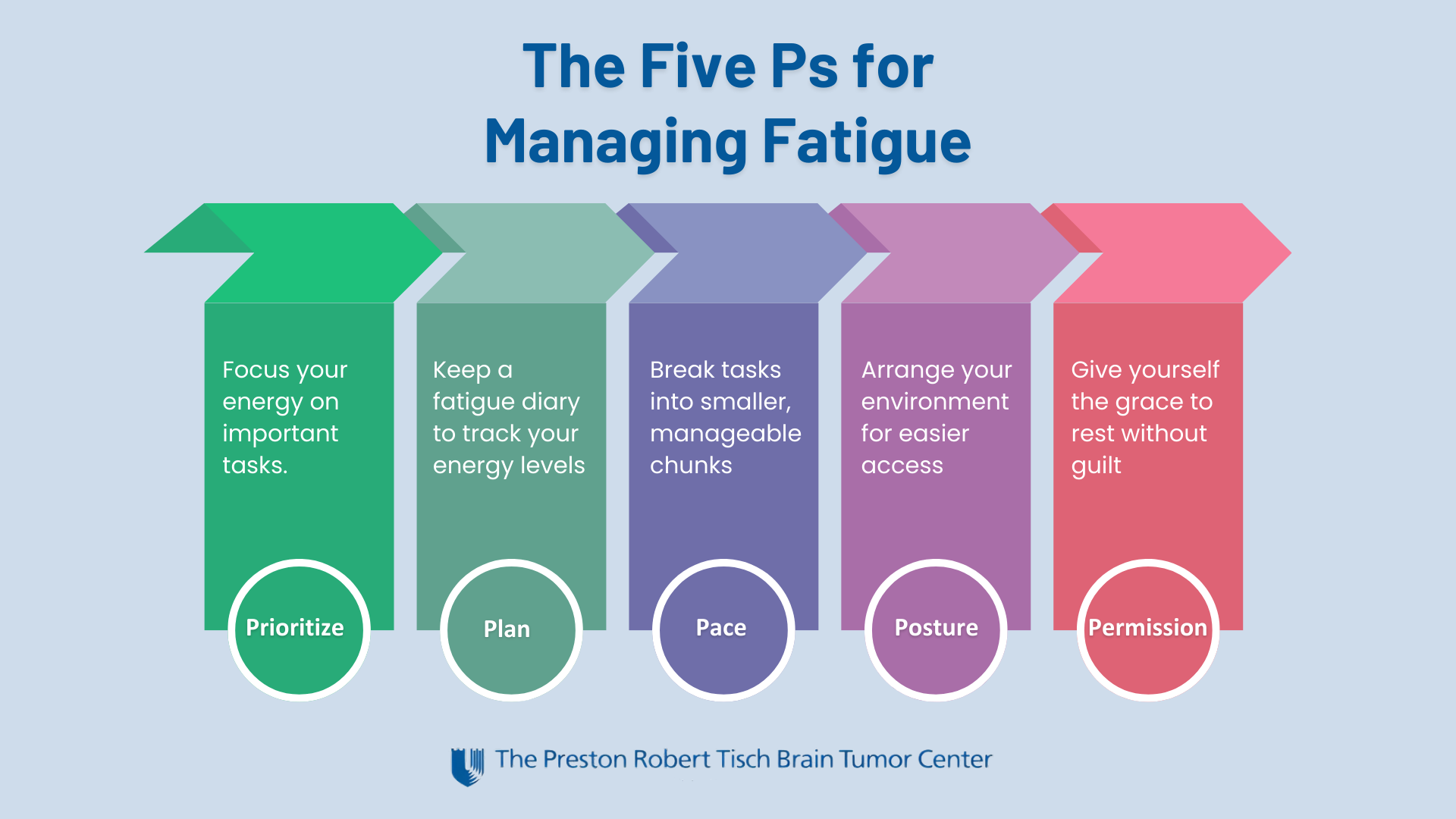How to Manage Fatigue During Brain Tumor Treatment

Feeling exhausted all the time, no matter how much you rest? Fatigue is one of the most common challenges brain tumor patients face, and it can feel like a constant drain on your physical and mental energy. Unlike everyday tiredness, this fatigue can be relentless.
The good news? There are proven strategies to help you manage it. At Duke’s Preston Robert Tisch Brain Tumor Center, we’re here to guide your cancer care every step of the way.
Understanding Brain Tumor-Related Fatigue
Fatigue from a brain tumor is different from regular tiredness. It can be caused by the tumor itself, treatments like surgery, chemotherapy, or radiation, and emotional factors such as stress or anxiety. Unlike normal fatigue, this type often doesn’t go away with rest and can feel overwhelming. Cancer-related fatigue among brain tumor patients is extremely common.
To manage fatigue effectively, it’s important to understand what’s causing it. Fatigue often creates a cycle: low energy levels worsen symptoms like pain, trouble thinking clearly, and poor sleep. In turn, these symptoms make you even more tired. Breaking this cycle requires a combination of strategies tailored to your needs.
Practical Strategies to Manage Fatigue
The good news is that you can take actionable steps to reduce the burden of fatigue. Here are some strategies that many patients find helpful:
The Five Ps for Managing Fatigue
- Prioritize: Identify the most important activities in your day and focus your energy on them. Less essential tasks can be postponed or delegated.
- Plan: Keep a fatigue diary to track when your energy levels are highest and schedule demanding tasks during those times.
- Pace: Break tasks into smaller, manageable chunks. Avoid pushing yourself too hard—take regular breaks and listen to your body.
- Posture: Minimize strain by sitting while completing tasks or arranging your environment for easier access.
- Permission: Give yourself the grace to rest without guilt. It’s okay to say no to activities or commitments that drain your energy.

Additional Tips for Coping with Fatigue
Need more helpful tips to manage chronic exhaustion? We have you covered:
- Stay Active: Gentle physical activity, like walking or yoga, can improve energy levels, sleep quality, and overall well-being. Even light movement, such as walking to the kitchen or stretching, can make a difference on challenging days.
- Eat for Energy: Try to incorporate more complex carbohydrates, lean proteins, and fresh vegetables into your nutritional diet to sustain energy. Avoid processed foods and sugary snacks—these can lead to energy crashes.
- Hydrate Regularly: Dehydration can exacerbate tiredness, so try to drink plenty of water throughout the day.
- Sleep Smart: Establish a consistent bedtime routine, avoid screens before bed, and keep your bedroom at a comfortable temperature to improve sleep quality.
- Manage Stress: Mindfulness practices, breathing exercises, or counseling can help reduce stress and prevent energy depletion.
Explaining Your Fatigue to Others
Fatigue from a brain tumor can be difficult to explain to family and friends. Unlike visible symptoms, fatigue is often misunderstood and dismissed. Using relatable analogies can help:
- Compare your energy levels to a rechargeable battery that depletes faster than before.
- Describe your energy reserves as a gas tank with an unreliable gauge—you’re never quite sure how much is left.
- Imagine carrying a heavy backpack all day, where every task adds more weight, making it harder to keep moving.
Helping others understand your experience can alleviate stress and foster a supportive environment.
How Duke Supports Patients with Fatigue Management
At the Preston Robert Tisch Brain Tumor Center, we not only provide comprehensive care but are also at the forefront of brain tumor research. Our clinical research programs focus on developing innovative treatments and improving the quality of life for patients. This commitment to advancing science means that patients at Duke have access to the latest therapies and resources, including ongoing studies that explore new ways to manage symptoms like fatigue.
Additionally, Duke offers access to support groups and educational materials, empowering patients to actively manage their health. Our commitment to providing compassionate, cutting-edge care sets us apart as a trusted partner in your treatment journey.
Learn more about our Adult Neuro Oncology program today.
Take the Next Step Toward Better Health
Fatigue doesn’t have to define your life during brain tumor treatment. Implement these strategies and seek support so you can reclaim energy and focus on the moments that matter most. At Duke University’s Preston Robert Tisch Brain Tumor Center, we’re here to help.
If fatigue is affecting your quality of life, don’t wait to get the support you need. Schedule an appointment with our expert team today and discover how we can partner with you to overcome this challenge. Our compassionate team of doctors is ready to walk with you every step of the way.
Explore our blog to learn more:
- The Importance of Support Groups for Brain Tumor Patients
- Mindfulness Techniques for Brain Tumor Patients and Caregivers
- How to Support a Loved One with a Brain Tumor
Frequently Asked Questions About Managing Fatigue
1. Can fatigue improve after brain tumor treatment?
Yes, many patients notice an improvement in fatigue within six months to a year after treatment ends. However, for some, fatigue may persist long-term. Discussing your symptoms with your healthcare team can help identify strategies for relief.
2. Do people with brain tumors sleep a lot?
Yes, excessive sleeping can be common for people with brain tumors. Fatigue from the tumor itself, treatments, or emotional stress may cause individuals to feel the need to sleep more than usual. However, even with more sleep, people often still feel tired and unrefreshed. If this is a concern, it’s important to discuss it with your healthcare team to explore possible solutions.
3. What’s the difference between mental and physical fatigue?
Mental fatigue often manifests as difficulty concentrating or decision-making, while physical fatigue causes muscle weakness or a sense of heaviness. Both types are interconnected, and addressing one often helps the other.
4. Should I avoid naps if I’m feeling fatigued?
Short, planned naps can be beneficial if you’re feeling fatigued, but try to keep them under two hours. If you find yourself consistently napping more than two hours a day, consider talking to your care team for further guidance.
5. Are there medications that can help with fatigue?
In some cases, medications may help address underlying factors like anemia, depression, or pain. Always consult your healthcare provider before starting any new treatments.